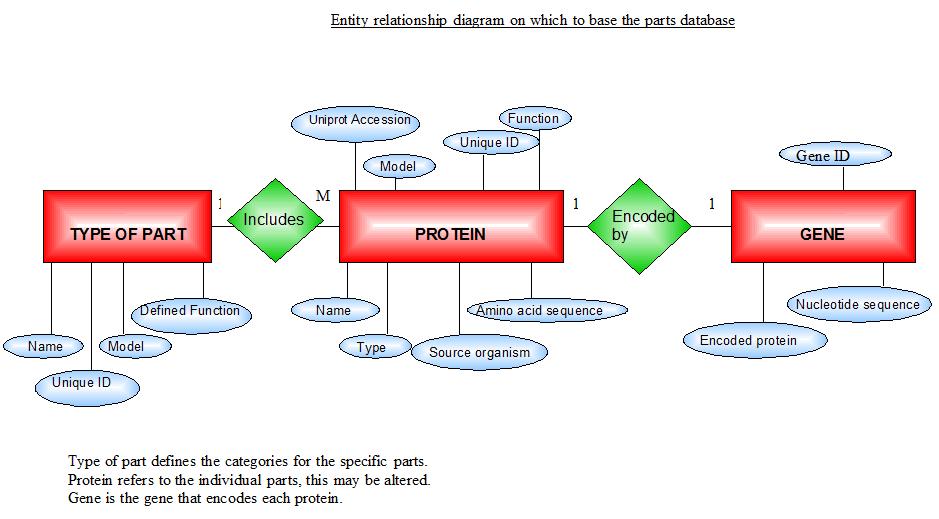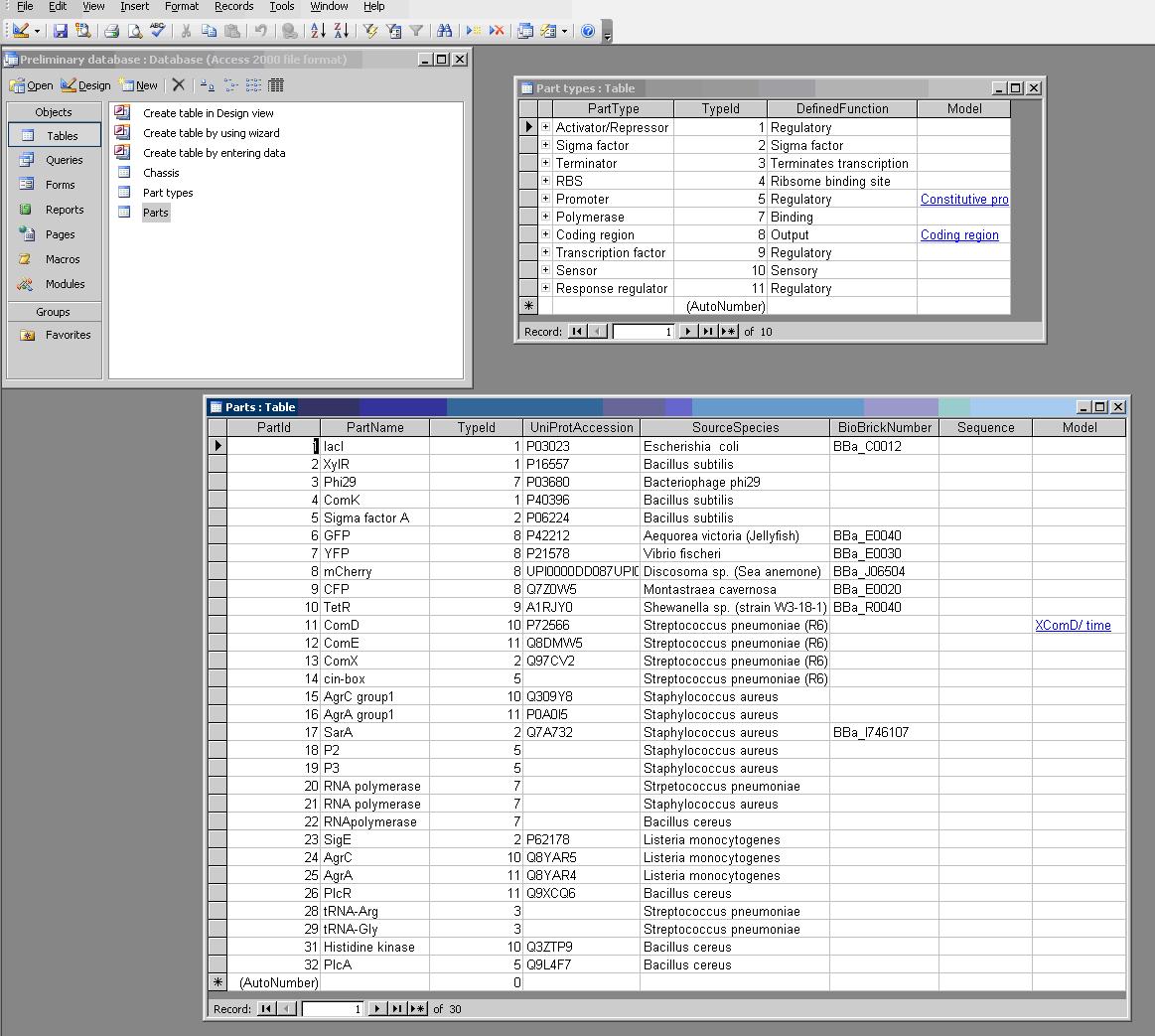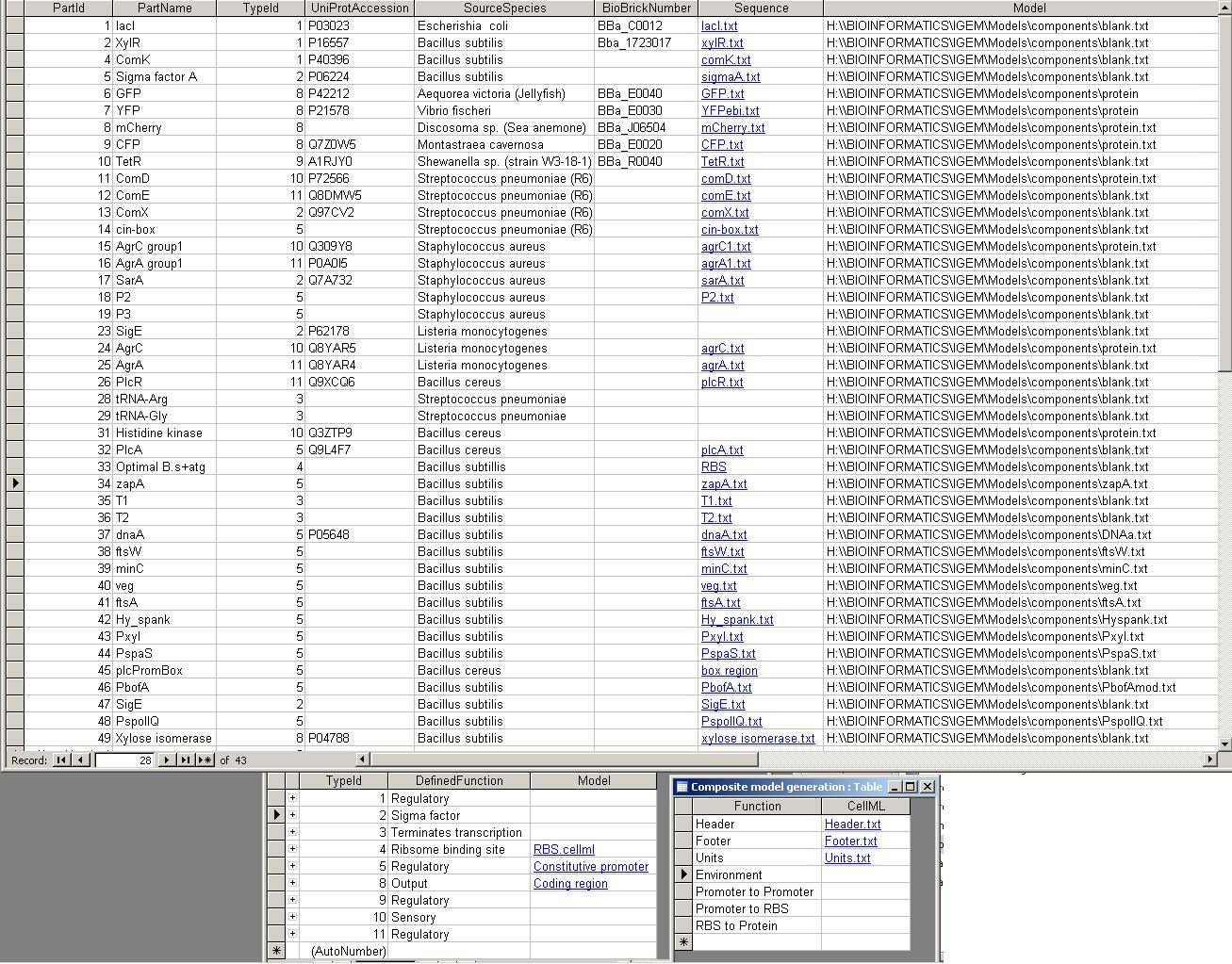Team:Newcastle University/Parts Repository
From 2008.igem.org
| Line 29: | Line 29: | ||
The work for the Parts Repository (PR) was concluded on 1 Sept 2008. | The work for the Parts Repository (PR) was concluded on 1 Sept 2008. | ||
| - | |||
| - | The | + | ==== Parts Repository ==== |
| + | The database repository of genetic parts for bottom-up modelling of synthetic biology. Implemented as a Microsoft Access database. | ||
| - | + | The PR attempts to completely define a "part", which can be any genetically defined construct. These can include BioBrick parts and devices, as well as independently defined objects like the 2-part quorum sensing systems used in the BugBuster project. | |
| - | + | * [[Team:Newcastle University/Defining Parts|Progress towards defining Parts]] | |
| - | + | <gallery> | |
| + | Image:Erd-big.jpg |The Entity Relationship Diagram for the parts repository database | ||
| + | Image:database_screen_shot.jpg | A screen shot of the populated database | ||
| + | Image:relationships.jpg | Showing relationships between the Parts and their IDs | ||
| + | Image:Db.jpg | Another view of the populated database, with defined functions for parts | ||
| + | </gallery> | ||
| - | |||
==== Part Sequences ==== | ==== Part Sequences ==== | ||
The nucleotide sequences for the parts used in the BugBuster project, to further define the function of a part in the part repository. | The nucleotide sequences for the parts used in the BugBuster project, to further define the function of a part in the part repository. | ||
| - | ==== | + | ==== CellML models ==== |
| - | The | + | The behaviour of each part was defined by a [http://www.cellml.org/ CellML model]. |
| - | + | Some of the models are complete, and others are incomplete. It is suggested to compile the models in [http://cor.physiol.ox.ac.uk/ COR] and to run them in [http://www.cellml.org/tools/pcenv/ PCEnv]. | |
| + | There are also some components, which are the fragments of CellML code that are associated with each part, and fragments to create complete models from these. They appear as they are stored in the parts repository for access by the iGEM project as a whole. | ||
| + | |||
| + | ==== iGEM Java programme ==== | ||
| + | |||
| + | This is an interface that allows easy access to the items stored in the PR database without needing knowledge of the database structure. It is written in Java to access via webservices. The Javadoc is available. | ||
| - | + | ==== Further Reading ==== | |
* [[Image:Characterisation_of_the_comabcde_pathway_in_s.ppt]] | * [[Image:Characterisation_of_the_comabcde_pathway_in_s.ppt]] | ||
| - | |||
* [[Image:Comd_noinducsynthwithcomep_.zip]] | * [[Image:Comd_noinducsynthwithcomep_.zip]] | ||
| - | |||
| - | |||
| - | |||
| - | |||
| - | |||
Revision as of 13:30, 27 October 2008
Newcastle University
GOLD MEDAL WINNER 2008
| Home | Team | Original Aims | Software | Modelling | Proof of Concept Brick | Wet Lab | Conclusions |
|---|
Home >> Original Aims >> Parts Repository
Parts Repository
Aim:
To develop a system that will define the kinds of parts that make up a biological circuit and their behaviour.
Computers do not know any biology. Many of the other projects involve manipulating data without any need to understand its biological meaning. This module is responsible for capturing biological knowledge and how it relates to that data. So the parts that make up a biological system need to be described in a computationally accessible manner. This system will model the parts that make up the biological circuits. Efforts to define parts are already underway in the BioBricks community, and this project will build upon these.
Objectives:
- to develop a database that stores clear definitions of the components of a genetic circuit, including:
- sequences
- important domains
- abstract model(s)
- the ontology of component types
- provenance back to e.g. BioBrick of origin
- to develop an API that will provide access to the repository in a standard, easily usable manner
Contributors
Lead: Megan Aylward
Outcomes
The work for the Parts Repository (PR) was concluded on 1 Sept 2008.
Parts Repository
The database repository of genetic parts for bottom-up modelling of synthetic biology. Implemented as a Microsoft Access database.
The PR attempts to completely define a "part", which can be any genetically defined construct. These can include BioBrick parts and devices, as well as independently defined objects like the 2-part quorum sensing systems used in the BugBuster project.
Part Sequences
The nucleotide sequences for the parts used in the BugBuster project, to further define the function of a part in the part repository.
CellML models
The behaviour of each part was defined by a [http://www.cellml.org/ CellML model].
Some of the models are complete, and others are incomplete. It is suggested to compile the models in [http://cor.physiol.ox.ac.uk/ COR] and to run them in [http://www.cellml.org/tools/pcenv/ PCEnv].
There are also some components, which are the fragments of CellML code that are associated with each part, and fragments to create complete models from these. They appear as they are stored in the parts repository for access by the iGEM project as a whole.
iGEM Java programme
This is an interface that allows easy access to the items stored in the PR database without needing knowledge of the database structure. It is written in Java to access via webservices. The Javadoc is available.
 "
"





